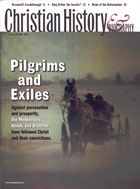Our congregation gathered for worship on a beautiful September Sunday morning at the Conley farm in western Lancaster County, Pennsylvania. This was the fourth of a series of weekend meetings we call "love feast"—the high point of our church year. An intense spiritual experience, the series culminates on Saturday evening as the plainly dressed, bearded brothers and the sisters in their capes, aprons, and snow white head coverings wash one another's feet. Then, positioned around long wooden tables, they exchange the kiss of peace and pass the bread and cup of Communion in a complete circuit.
"Having meeting"
All of this takes place in a spacious Pennsylvania "bank" barn, built in 1876. The barn had been merely an agricultural building until, a few days before the services, a crew of the brethren had attacked it with brooms and blowers, preparing it to house more than 200 worshipers. Now the congregation gathered here for four separate services of preaching, singing, and testimonies totaling more than ten hours. The heartily sung but slow a cappella melodies of the brothers and sisters rose to the rustic rafters. To many of those assembled, this was as inspiring as a trained choir in an ornate cathedral.
If asked, none of the members would say the barn had "become a church." Neither would they say they were "going to church" when they gathered for their regular weekly worship services. Instead they might say "the church was having meeting" in the barn. The brothers and sisters of like precious faith are the church, and not having a regular building for their worship accentuates this fact. Although this congregation has many of its meetings in their school close by, the families of the brotherhood take turns sponsoring the meeting, which includes providing a noon meal.
This small body of Christians is one of many independent "plain people" groups. They represent a version of Christianity that stresses simplicity in lifestyle, especially in dress and worship. There is no nonsense in their worship: no effort to entertain the members with special music, no dramatic lighting, grandiose art or architecture, or professionally trained ministry. The focus is the inspired Word of God, which, when preached, moves many to tears.
Varieties of plainness
The people meeting at the Conley farm belong to the Old Order River Brethren. This group is often confused with the much larger and better known Old Order Amish, with whom they have much in common—plain clothing, beards, simple worship in houses and barns. But the Amish forbid car ownership and electricity from public utilities, and use German in their worship and Pennsylvania German in everyday life; all of which are not typical of the majority of Old Order River Brethren.
There are also numerous groups of conservative Mennonites close by, each with their own distinctive symbols and practices. All are "plain people." Most of the different plain groups associate and cooperate with each other in various ways (half the students in the Old Order River Brethren school are from conservative Mennonite families). Actually, distantly related groups who share common convictions on non-conformity to the world interact more with each other than with the mainstream groups from which they withdrew.
All of the plain elements of the Anabaptist family grew from a similar concept of the church as a visible body of believers, distinct from the world in almost every way. Many of these spiritual descendants of the 16th-century Anabaptists (Old Order Amish and Old Order Mennonites) adhere to a confession of faith drawn up in 1632 at Dordrecht, the Netherlands:
"We believe in and confess a visible Church of God, consisting of those who … have truly repented, rightly believed, are rightly baptized, are united with God in heaven, and incorporated with the communion of the saints on earth. And these, we confess, are a 'chosen generation, a royal priesthood, a holy nation': who have the testimony that they are the 'bride' of Christ; yea, that they are 'children and heirs of eternal life,' a 'habitation of God though the spirit,' built on the foundation of the apostles and prophets, of which 'Christ himself is the chief cornerstone'—the foundation on which his Church is built" (Article 8, "of the Church of Christ").
Bearing fruit, bearing witness
All the plain churches emphasize Nachfolge Christi—following Christ in discipleship. They believe that true Christian disciples are the visible people of God, fully committed to faithfully serving Christ as they walk in newness of life. Christ is not just a Savior who gives forgiveness from sin, but the Lord of all life who will be lovingly obeyed. The fruits of the Spirit are evidence of a regenerated heart.
The church's primary calling is to be a separated people of God, as expressed in Ephesians 5:27, "a glorious church, not having spot, or wrinkle, or any such thing; but that it should be holy and without blemish." Those members who forsake the faith and fall into sin must be dealt with in order to maintain the purity and unity of the church. In disciplining those who stray, the church carefully follows the directives of Matthew 18. If the sinner, after every effort has been made at reconciliation, does not repent, he or she must be disciplined. The hope is that when this is done in the spirit of love, the wayward soul will see the seriousness of his or her sin and have a change of heart.
But discipline is not just for the offender. It is also seen as a protection for the whole church: "A little leaven leaveneth the whole lump" (1 Corinthians 5:6). If the church tolerates sin, this affects the whole body. The purity of the church must be protected at all cost, regardless of any pain and distress experienced by individuals. The plain people see the excommunication of members who have fallen into sin as an act of love for the church, removing occasion for those outside the ranks to speak evil of her—and of Christ.
To prune or not to prune
All Anabaptists believe that members who have been cut off from the body can be reattached if confession and repentance first occurs. Some of the groups, however, go to greater lengths to help this come to pass. The Amish and a few groups of Mennonites (Holdeman, Stauffer, Reformed) see Paul as teaching a kind of "tough love" in 2 Thessalonians 3:14, 15—"Do not associate with [the disobedient one], in order that he may feel ashamed. Yet do not regard him as an enemy, but warn him as a brother."
These stricter Anabaptists interpret 1 Corinthians 5:11, "With such a man [a brother who has fallen into serious sin] do not even eat," quite literally. They believe the passage refers not just to the Lord's Supper but to any common table, and so they enjoin the disciplinary practice of "shunning," even within the family of the offender.
This is a strict measure, to be sure. But it is meted out not in the spirit of retributive punishment, but rather out of a desire to jolt the rebellious brother or sister back to their senses, as they taste the pain of separation from the body of believers and see that it will extend into eternity if they do not repent.
The early Anabaptists frequently charged the state churches with toleration of sin in their ranks, both among the clergy and laity. In return, Christian outsiders have often labeled the more conservative Anabaptists as "legalists." This was true even in Menno Simons's day, causing him to protest, "And should someone come who would in true and sincere love admonish or reprove them and direct them to Jesus Christ. … and show that it does not become a Christian to carouse and drink, and to revile and curse, he must from that hour hear that he is a legalist."
If legalism is works-salvation that seeks to merit God's favor through human effort, then it cannot accurately be applied to American Anabaptists. Despite harsh accusations to the contrary, none of the plain people believe that their works of righteousness will gain them a home in heaven. Virtually every doctrinal statement of all conservative Anabaptist groups proclaim that salvation is through faith in the shed blood of Christ. The Dordrecht Confession states, "[Christ] purchased redemption for the whole human race; and has thus become the cause for the eternal salvation of all these who from the time of Adam to the end of the world shall have believed in him, and obeyed him."
Living in covenant obedience
Belief in Christ is, however, inseparably linked to obedience to Christ. Yes, faith is held as the most essential element of salvation (the Dordrecht Confession opens with Hebrews 11:6—"Without faith, it is impossible to please God"), but plain people do not ignore the importance of James 2:20, "Faith without works is dead." They do not regard their outward separation from worldly society any differently than mainstream evangelicals view tithing or verbal witnessing. They believe that Christians will sacrifice all areas of their lives to the lordship of Christ, and that their visible symbols of nonconformity to the world are a constant witness and proclamation to the saving grace of God.
Just as the apostles determined the will of God in the controversial issues of their day (Acts 15), the plain people believe that it is the responsibility of the church to create scriptural standards of practice as new issues arise. The collective voice of the church is perceived through the guidance of the Holy Spirit as revealed through the convictions of individual members and the discernment of the leadership.
As part of the baptismal vows in most plain churches, each member promises to uphold the standards of the church and be yielded to the corporate voice of the brotherhood. Members who disobey individual directives of the church are often disciplined for a spirit of rebellion rather than the actual violation. Thus, when a member is disciplined for wearing a necktie, driving a car, or owning a television, the real problem is not necessarily the particular offense but the breach of promise in not upholding the collective order of the church.
The plain people take their relationship to their church very seriously. One's church affiliation is the primary identity of an individual, and others are often identified by their respective church affiliation, whether it be a "Wenger" Mennonite friend, a Church of the Brethren neighbor, a Lutheran postal clerk, or a Catholic mechanic. This identity involves much more than intangible doctrines or beliefs, but how these beliefs affect one's daily life, attitudes, and ethics.
Stephen Scott is administrative and research assistant at the Young Center for Anabaptist and Pietist Studies at Elizabethtown College, Elizabethtown, Pennsylvania.
Copyright © 2004 by the author or Christianity Today/Christian History & Biography magazine.
Click here for reprint information on Christian History & Biography.

Support Our Work
Subscribe to CT for less than $4.25/month





























